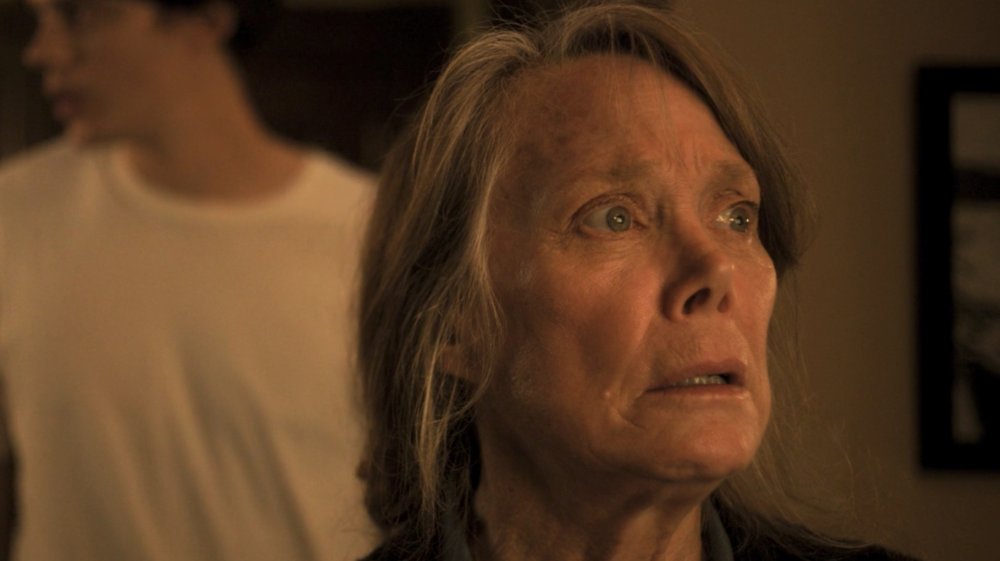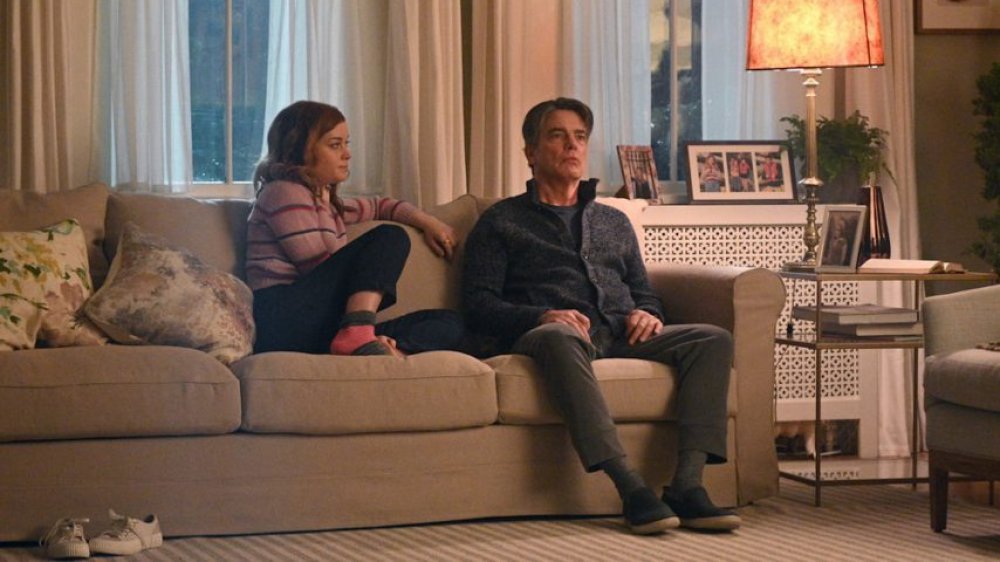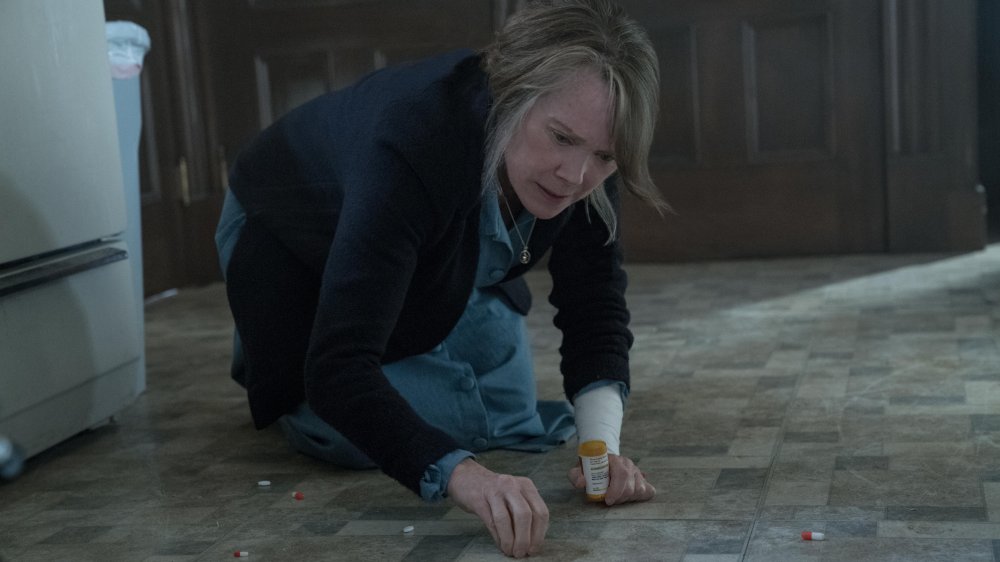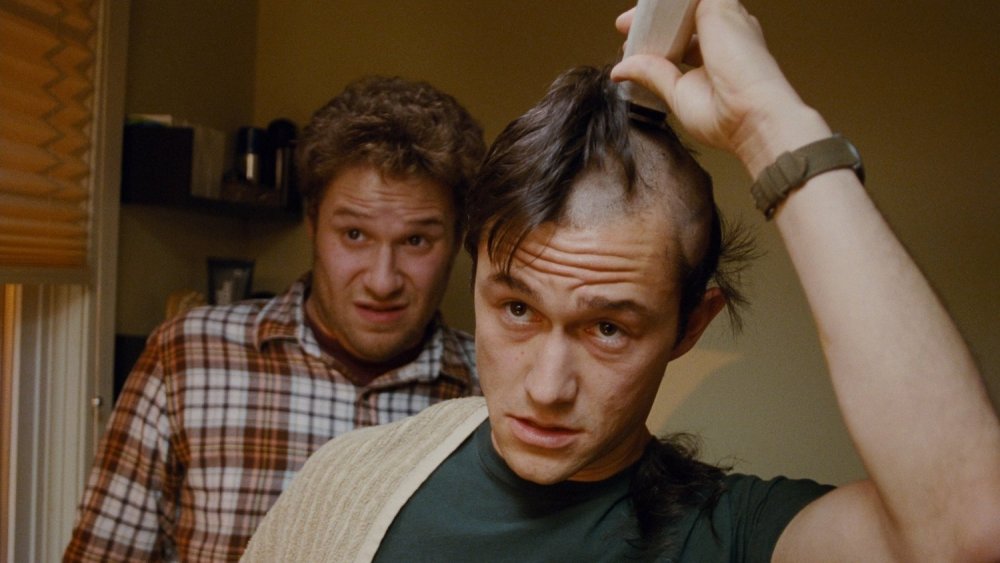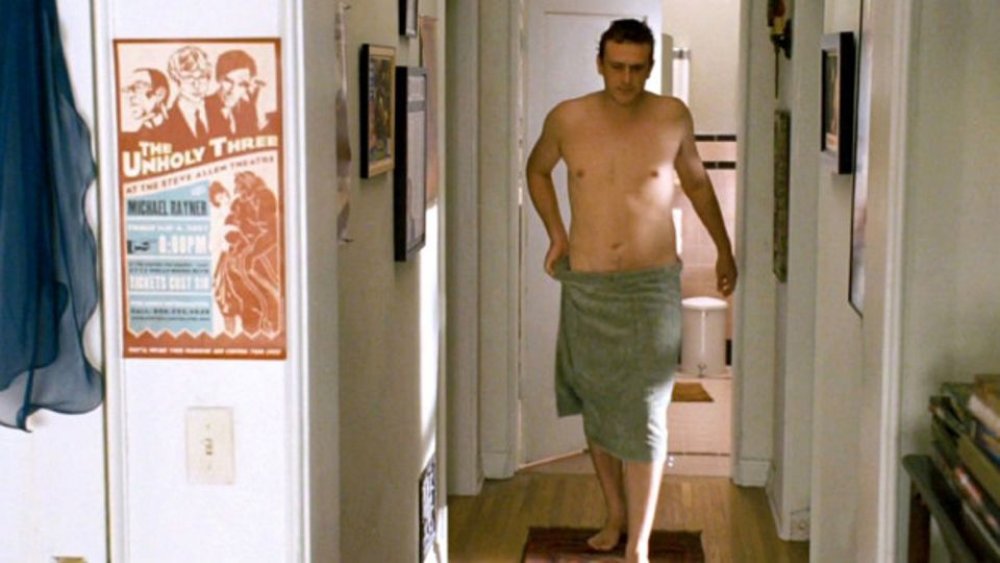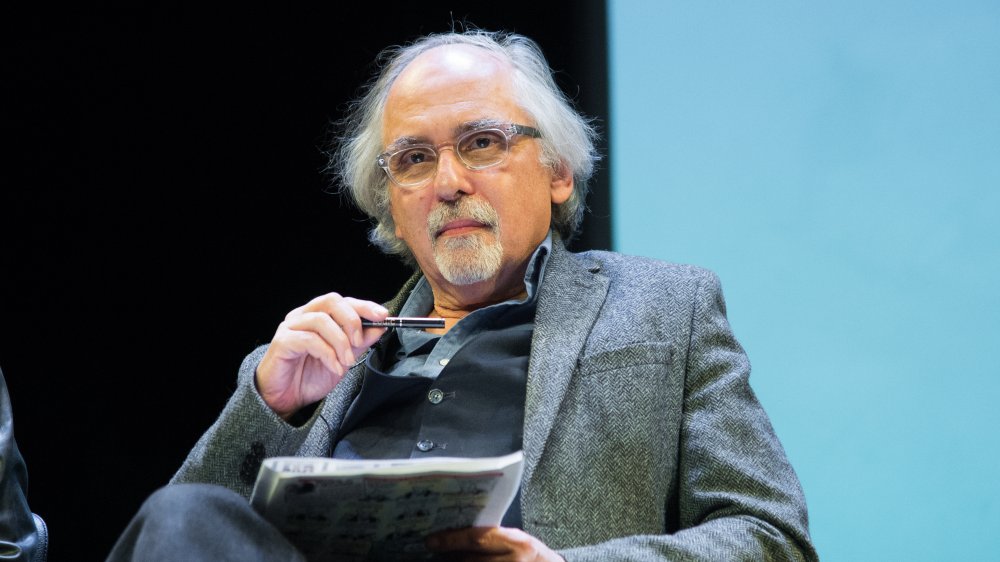Writers Who Put Personal Tragedy Into Storylines
Conflict is at the heart of just about any story, and tragedy — while a subjective term — is a solid source of conflict in all its forms. Aphorisms about this abound — "comedy = tragedy + time" for one — and it's not hard to manufacture a tragedy. What's hard is for writers to put their own tragedy into stories. It can be too raw, too recent, or sometimes just too embarrassing. Sure, most writers make some part of their stories at least semi-autobiographical, but there's a difference between "this character is kind of shy, like me" and "this character is mourning a parent who died of the same thing mine did."
Some writers plot out a show's worth of storylines based on personal tragedy, while others contain it to one episode. Some fictionalize the worst moments of their life to confront it head-on. If you're Stephen King, it might even be a near-verbatim retelling with Spooky Stuff added for good measure. Here's a bunch of storylines from across all media that were inspired by personal tragedy.
Mitch's PSP in Zoey's Extraordinary Playlist was a retelling of the showrunner's story with his own father
One of the throughlines of Zoey's Extraordinary Playlist is the Clarke family dealing with her patriarch Mitch's progressive supranuclear palsy (PSP) diagnosis. The disease has robbed him of his ability to speak, move, or express himself — at least until Zoey starts hearing people express their hidden feelings via song. This was all inspired by showrunner Austin Winsberg's experience with his own father Richard, who died of the disease.
Richard died in 2011, and as the disease progressed, the family had a harder time communicating with him. Austin told the AP that he figured out how to address that in his work years later. "One day I thought, 'What if the way that my dad saw the world during that time was through musical numbers?' And somehow the idea of that made me smile, and it brought a little joy out of something that felt very sad and tragic."
Winsberg explained the process in more detail to The Hollywood Reporter after the season one finale. "Everything you saw over the course of the season in the house," he said, "was literally stuff that happened in my family's house during those months." Using a taboo buzzer to communicate, asking for lemonade via a computer, falling down stairs, and bringing in a caregiver — all of it was real. Sometimes he was able to compartmentalize what he did, but other times "I'd be on set with Peter [Gallagher, who played Mitch] and he would so channel something that my dad did... I'd have to leave [the] set because I was so emotional." Table reads often came with tears, but "some of those tears are cathartic and therapeutic."
The King of Staten Island allowed Pete Davidson to heal from his father's death on 9/11
Scott Davidson, father of Pete Davidson, died on 9/11. He was part of the infamous final run of Ladder 118 and was last seen running into the Marriott World Trade Center. Pete's never been shy about confronting that fact — at the Roast of Justin Bieber, Davidson told Snoop Dogg and Kevin Hart that "Soul Plane was the worst experience of my life involving a plane" — but he definitely saw it as something of an unclosed narrative in his life. The King of Staten Island, based on his own life, helped with that.
Judd Apatow first met Davidson after casting him in a small role in Trainwreck. The two kicked around movie ideas before landing on what would become The King of Staten Island, but realized they'd need to all-in on it. Apatow told the AP that "As soon as we said, 'Let's make a movie about his character's mom dating a firefighter,' we knew that we'd have to address everything." Davidson produced and co-wrote the movie, a cathartic process for him that required him to see his own story from other perspectives. He calls the movie "100% me."
The King of Staten Island shows a version of what Davidson's life could have been had he not found comedy as an outlet. He plays Scott — named after his father — a 24-year-old burnout who spends most of his day hanging out with friends and smoking weed. He's had a case of arrested development ever since his fireman dad died on the job. (He still died putting out a hotel fire, but not on 9/11.) Scott's mother starts dating a fireman, forcing self-reflection and growth.
Davidson said that doing the movie "allowed me to heal on a personal level. My main goal in doing this was to grow out of it."
The Big Sick is a fictionalized version of Kumail Nanjiani and Emily V. Gordon's real story
Kumail Nanjiani met Emily V. Gordon after she heckled him at a comedy show in 2007, which somehow led to them dating. After dating for a few months, Gordon went to the hospital with a lung infection and doctors wanted to put her in a medically induced coma. Nanjiani was pressured by doctors to sign a consent form, despite the fact that he was barely her boyfriend. She stayed in a coma for over a week, with Nanjiani by her side the whole time, until she was diagnosed with Still's disease and treated. During this time, Nanjiani dealt with a host of other related issues, including his Pakistani-Muslim family's disappointment that he was dating a white woman. Nanjiani and Gordon married only a few months after she came out of the coma.
In 2012, Nanjiani was a guest on a live taping of the You Made It Weird podcast, alongside Judd Apatow. The two men spent some time together after the show, and Apatow called Nanjiani's manager the next day to ask if Nanjiani had any ideas floating around. Nanjiani and Apatow met up a few more times, during which Nanjiani pitched a story about his experience during Gordon's coma. Gordon herself soon joined as a co-writer.
The end result was The Big Sick, a fictionalized version of their story. Certain parts were changed for dramatic effect, including the characters of Kumail and Emily breaking up before the coma. Many parts were lifted directly from the real-life story, including the two meeting after she heckled him at a comedy show.
Ruth Deaver's dementia on Castle Rock is based on the co-creator's own family
The first season of Hulu's psychological thriller Castle Rock featured Sissy Spacek as Ruth Deaver, a mother dealing with early onset dementia. Her struggles with the disease permeate the season and "The Queen," the seventh episode, is largely told from her point of view. These struggles, and "The Queen" in particular, came from co-creator Sam Shaw's own family experiences.
In an interview with the Alzheimer's Association, Shaw explained that the season dealt with memory and identity, so the writers decided "decided it would be interesting if Ruth was grappling with early-onset Alzheimer's." The subject was always on his mind: "all four of my grandparents battled one form of dementia or another at the end of their lives, and my mother was dealing with it at a much younger age." He suspects that there "was probably something cathartic" in writing that storyline — especially since his mother died a week or two after they all started writing.
The Farewell is "based on an actual lie"
In 2016, filmmaker Lula Wang wrote and narrated a story for This American Life titled "In Defense of Ignorance." Her grandmother was diagnosed with stage IV lung cancer and given three months to live. The family withheld this information from her. Instead, they planned a way for family members from three countries to come together and say goodbye under less scary pretenses. As such, they cooked up the story that one of their relatives was having a wedding banquet and they'd be celebrating in China. Wang described having to keep up the lie against her will because it would be her last chance to see her grandmother.
Wang had previously pitched the story to producers with no success, which inspired her to bring it to radio. One of the listeners was Chris Weitz, a writer and producer behind movies ranging from American Pie to About a Boy and Rogue One. He signed on and helped her make it into a movie, released in 2019: The Farewell, the opening title of which says it is "Based On An Actual Lie." The film won critical acclaim, and won Awkwafina a Golden Globe for Best Actress — Musical or Comedy.
'The Body' on Buffy the Vampire Slayer can be traced back to the death of Joss Whedon's mother
"The Body" is one of the most acclaimed episodes of Buffy the Vampire Slayer, and one of the hardest to watch. The episode begins with Buffy discovering her mother dead on the couch of an aneurysm. The story follows Buffy and the Scooby Gang dealing with the immediate aftermath of the death of a loved one — not a unifying moment that brings people together, but a messy and confusing one when nobody is able to learn much of anything.
The episode feels personal — largely because it is. Joss Whedon revealed to Metro that it was inspired by his own mother dying. "My mother died when I was 27 in a car crash," he said. "But I didn't really think about mining [the experience] until around season three." It was finally a chance for Buffy to not have an answer, to deal with an enemy she couldn't fight. As such, writing a version of his own pain was a good way to test Buffy's resolve.
50/50 is inspired by Will Reiser's own cancer diagnosis
In 2005, 25-year-old comedy writer/producer Will Reiser was diagnosed with a rare form of spinal cancer and given coin-flip odds of survival. He'd joke with one of his best friends — a guy by the name of Seth Rogen — and occasionally joke about making a buddy comedy about cancer. "Back then," Resier told IndieWire, "it was our way of being able to handle it." Post-surgery and during recovery, Rogen and writing partner Evan Goldberg urged Reiser to actually write the script. In 2008, after he spent time processing what he went through, he had a first draft. Three years later, in 2011, the movie was released under the name 50/50.
Reiser says that "the movie's fiction and inspired by what I went through." That said, there's parts of it that are either autobiographical or at least reference specific events during his illness. One such instance came from Seth Rogen — who starred in the movie in a role that mirrors his friendship with Resier — changing his friend's bandages despite an aversion to bodily fluids. A more personal moment was the main character's relationship with his mother, in which he gets sick of her babying him and pushes her away until the last minute. Reiser wrote in the Los Angeles Times that he was concerned about his mother's reaction to such a sensitive relationship getting portrayed onscreen, only for her to feel "liberated" by it.
The Unicorn is based on a widow the showrunners knew
CBS sitcom The Unicorn tells the story of Wade, a recently widowed father of two and successful businessman who starts dating again — only to find out being a committed family man makes him highly desirable. It's also about finding a way to live again after experiencing grief. According to star Walton Goggins, the show is based on a true story.
Goggins explained in an interview with CBS Los Angeles that The Unicorn is based on a person show creators Bill Martin and Mike Schiff knew. "They were there for their actual friend who lived this. He lost his wife and they had two daughters and they were on the front lines supporting their friend go through this. They saw how absurd and how crazy that journey was." One day this friend asked Martin and Schiff if his story was interesting, to which they responded with an enthusiastic yes.
Stephen King wrote the accident that almost killed him into The Dark Tower
On June 19, 1999, Stephen King was taking a walk when he was struck by a minivan. Well, "struck" is an understatement: King was hit so hard that flipped over the van and flew into a ditch 14 feet away while his glasses ended up in the front seat. The driver, Bryan Smith, was distracted after his rottweiler got loose in the van and didn't even realize he hit a human at first. King ended up with a broken hip, pelvis, leg, and ribs. Smith had a reputation as a simpleton and had 11 prior convictions for speeding or DUI, but got away with a suspended sentence — a fact that perturbed King after Smith called it "accident without a cause."
Smith was found dead in September of 2000 due to an overdose. King released a statement saying that he was sorry to hear about it: "'The death of a 43-year-old man can only be termed untimely." King had not, however, moved on from the incident.
2004's The Dark Tower, the conclusion of King's seven-book series of the same name, re-told the story of the accident. By this point, King himself had become a character in the series, whose authorship of the Dark Tower series became necessary for the survival of those within. Main characters Roland Deschain and Jake Chambers travel to earth and find Bryan Smith in his van about to hit King, but Jake sacrifices himself and takes the killing blow to save King's life.
The naked breakup in Forgetting Sarah Marshall actually happened to Jason Segel
The tragedy at the center of Forgetting Sarah Marshall is pretty pedestrian: a guy dealing with an unexpected breakup. The first scene of the movie — the infamous naked breakup — is a far more specific tragedy. Much of the movie was loosely inspired by events in Jason Segel's life, but that scene in particular specifically happened to him — and knew he'd have to include it in a movie one day.
A few years before he wrote the script, Segel got a call from his girlfriend that she was headed to his apartment. He stripped down and waited for her, only for her to say "we need to talk" upon arrival. "And it's never 'we need to talk, I love you so much,'" he said on The View in 2018. Halfway through the breakup, he stopped to get dressed. "It turns out picking out an outfit for the second half of a breakup is like the worst outfit you'll ever pick out." He wrote this scene into the script but cut it for pacing.
"I was trying to experience this viscerally, as a person, but all I could think was: "This is hilarious,'" he told the New York Times. "'I cannot wait for her to leave so I can write this down.'" Segel fought for the scene's inclusion in the movie, and it was one of the final scenes shot. Kristen Bell told Entertainment Weekly that "the beginning of the day was vulnerable, it was apparent that we were all friends, because by the time we had moved on from close-ups, Jason was still naked and didn't realize it." The staff wore shirts with pictures of Michelangelo's David to support and/or mock Segel that day.
Still Alice was written by a neurologist dealing with Alzheimer's in her own family
Still Alice, published in 2007, tells the story of 50-year-old Harvard psychology professor and linguistic expert Alice Howard after she's diagnosed with early onset Alzheimer's. The book was a New York Times Bestseller and was adapted to a critically acclaimed movie in 2014 starring Julianne Moore in an Oscar-winning role. The book was written by Lisa Genova, who was a Ph.D in Neuroscience from Harvard. As she revealed in an interview with Alzforum, this was inspired by watching her own grandmother face the disease.
During Genova's time in grad school, her family found out that her grandmother had Alzheimer's. She was in her mid-80s, and they had reason to believe she'd had it for years but her whole family looked the other way. "We cared for her," said Genova, "but there was little we could do but watch this disease systematically disassemble the woman I knew as my grandmother." She describes watching her grandmother slowly forget where she lived, the names of her children, the fact that she had children at all, and eventually her own face in the mirror.
"At the same time," Genova added, "as a neuroscientist I found it fascinating." It led her to wonder what was going on at a molecular level and how the brain compensated for the deterioration. It was too late to talk to her grandmother about this, but got her wondering about early onset cases — an angle that hasn't been told too often. She decided to write a book, and did a ton of research: she read countless books, talked with other neurologists, and checked in with people actually living with the disease to make sure she was on the right track.
Relic was a director/writer working through guilt
Relic is a horror movie about three women — grandmother, mother, and daughter — haunted by the physical manifestation of dementia in their home. It's the first movie from writer/director Natalie Erika James, and it's inspired by her actual experiences with her family. Not the Dementia Demon part — at least, we hope not — but the subject matter comes from a personal place.
James has split her life between Japan and Australia. Her grandmother lived in Japan and suffered from Alzheimer's. James told Looper that she visited her grandmother in 2014 "and it was notable to me because it was the first time she couldn't remember who I was." James' "feelings of guilt were stemming from not having gone to see her more often." On top of all that, her grandmother "lived in this house that I had been really kind of terrified of as a kid." James, a horror fan, realized she could combine all this into a "haunted house framework" to tell a good story.
In the Shadow of No Towers was Art Spiegelman working through surviving 9/11
On September 11, 2001, cartoonist Art Spiegelman and his wife left their Manhattan loft — ten blocks from the World Trade Center — and saw a plane crash into the North Tower. They weren't entirely sure what happened, but their daughter was nearby at school and they realized they had to get her. By the time they got to the school, the South Tower was hit. While searching for their daughter, the South Tower fell and the building shook. Just after they left, they saw the North Tower collapse. Before everyone ran away from the debris and toxic gas, Spiegelman saw an image that looms large in his memory: "the North Tower's glowing bones right before it vaporized."
Spiegelman worked through his grief and PTSD by creating a serialized comic strip titled In The Shadow of No Towers. It ran from 2002 through 2003 in irregular intervals, and allowed him to process his feelings in real time. His reconstructed image of the "glowing bones" was the main constant through his years writing this, as his focus went from a genuine fear that "the other shoe will drop" to anger at the Bush White House for using it as a pretense for invading Iraq. The series was published as a book in 2004.
